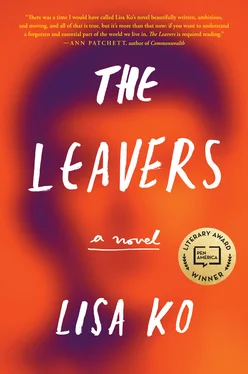With gray curtains stapled crookedly to the walls and graffiti crayoned across the bathroom door, this was an invite-only party where the bookers of venues like Jupiter, where Roland longed to play, came to check out bands. Roland knew the girl who managed the secret e-mail list, who had booked them on the basis of his past projects. If the Jupiter guy was into Psychic Hearts, he might book Daniel’s solo act one day.
Daniel scanned the crowd. A man with a mustache and white baseball cap was in the back by himself, wearing enormous brown hiking boots with orange laces. Daniel looked again at his own shoes. “That him? The Jupiter booker?”
Roland rolled his eyes. The math rockers had stopped playing. Anemic applause rippled through the front of the room and one of Roland’s friends looked over, gave a thumbs up. “You ready for this?”
“Always,” Daniel said.
THE FOURTH VODKA HAD been the mistake. By the time they finished the sound check, Daniel felt like he was seeing the room through another person’s glasses. He blinked at a spray-painted drawing of a cat on the far wall and returned to tuning his guitar, plucking the same string over and over. He wished more people were scrolling through their phones rather than looking at him, waiting for him to screw up. Roland played the first notes of the first song, started a beat on his Akai MPC60. Daniel produced a chord, sleek and assertive, and the song began to leak its colors, dark blues and lighter browns, like gut notes being forced through a tube. The six-song set list, scribbled at his feet, drifted up at him. He played a C, an E minor. Roland sang the first line. The notes sounded sad and clashing, deeply wrong, like the time he bit into a yellow square he thought was pineapple but turned out to be a very sharp cheese.
Roland kept going. They’d screwed up plenty at shows, and whoever was at fault would eventually right himself. It was their unspoken pact, like what parents said to kids — in case we get separated, return to the place we started from. But this time, the notes did not return. They had only practiced a few times, cocky with their years of history, and when Daniel squinted at the set list none of the titles were familiar. It wasn’t nerves — despite his age, he was no amateur — but more self-sabotage. You mess everything up . He lunged for a chord, then another. A riff came to him and he played it. It was his melody, a melody, and he wanted to play it louder, so he did. Bright orange pinwheeled around him. Feedback squealed. He saw people grimace, cover their ears.
Roland stopped singing and said, “This is a song called ‘Please, Show Me Your Fangs.’ ” He began the next song, but Daniel didn’t recognize this one either. It was like he’d woken up in a foreign country where everyone spoke a language he had never heard of, and was required to give a speech. “Learn to play,” one guy yelled. Daniel couldn’t see the Jupiter booker anywhere. The room grew hotter, narrower, and he could no longer hear anything except a rapid acceleration of agitated drumming, a scurry of horse hooves, vicious brushstrokes of gray over black. Danger, the drumbeat signaled. He had to fix it — he had to right himself — he was slipping so fast he could do nothing but tilt, like clicking the button to bet in No Limit Hold’em despite knowing his hand was crap, clicking again, watching the money dip lower, clicking again, unable to do anything but pursue this singular impulse toward ruin. He knew it was the worst thing he could do to Roland, that Roland might never forgive him and he would never forgive himself, but he couldn’t bear to be onstage any longer.
He unplugged his guitar and pulled it off. The beats continued. “What are you doing?” Roland whispered. Daniel lurched off stage, shoving his way through the crowd. He heard Roland calling his name, laughter as he ran out of the room.
He stumbled onto the street, cold air punching him in the face. He had left his coat upstairs. On the Bowery, passing Jupiter, a crowd lined up on the sidewalk. He imagined his name on the sign out front and looked away, then crossed at whichever light came on first, wandering south. He should give up music, go back to school, make his parents happy. Hanging a sharp left, he took Mott down to Canal, passing noodle shops and bodegas, everywhere signs in Chinese. He could make out one character and piece it to the next: LICENSED ACUPUNCTURE. INTERNATIONAL CALLING CARDS. Deciphering Chinese was a welcome distraction, and he walked faster, sliding in the snow, wiping his runny nose with his knuckles. Upstate, he had occasionally formed the sporadic outlines of a word in Fuzhounese, sensed the shapes it might make in his mouth, recalled a Sh or a Tze, but trying to find the right word was like wrestling with air, the meanings there but the sounds long lost. There wasn’t anyone he could speak to, even if he could.
After years away, he was shocked at how many people there were in Chinatown, streets in places he couldn’t remember, storefronts packed upon storefronts. Being surrounded by other Chinese people had become so strange. In high school, kids said they never thought of him as Asian or Roland as Mexican, like it was a compliment. He wasn’t that Chinese-or-Japanese-or-Korean-or-whatever kid with the professor parents but the guy who played guitar, who was in all those bands, who scowled in the back rows of Honors classes but always passed (everyone assumed, despite his test scores, that he was great at math). At Potsdam there had been a few other Asian students in his lecture classes, exchange students that clumped together or other lone wolves he’d see at parties surrounded by their own non-Asian friends. He avoided them; it was mutual. But he wasn’t at Potsdam anymore. There was only the city and its long, Lost Weekend: dancing at a party on a barge; a cab ride over the Williamsburg Bridge with Manhattan shining in the distance, five of them crushed into the backseat, a random girl on his lap, Roland in the front gabbing to the driver about intestinal flora or mushroom foraging; watching A Clockwork Orange late at night and stepping out into a Saturday sunrise. Nights like these, the past and present and future rolled out in a sugary wave, everyone he’d ever known riding alongside him on a merry-go-round to a soundtrack of whistling calliopes.
He tripped over his shoelace and bent down to retie it. Was all that gone, after tonight? Maybe there wasn’t so much to lose. There were mornings he would wake up on Roland’s couch, another solitary day stretching out in front of him, and he would trudge around in the cold for hours, not wanting to go back to the empty apartment, convinced he had made a fatal mistake. And now he had. He’d messed up in front of the people he longed to impress.
He rubbed the goose bumps that had formed on his arms, teeth chattering, and passed a cell phone store with signs in Chinese taped to the windows. Junior year of high school, he had seen a Chinese woman in the Littletown Mall. Thin, with permed hair, gripping plastic bags with the handles twisted around each other. She’d honed in; there was no hiding his face, and when she spoke he understood her Mandarin. She was lost. Could he help? She needed to make a phone call, find a bus. Her face was scared and anxious. Two teenage boys, pale and gangly, had watched and mimicked her accent, and Daniel had said, in English, “I can’t speak Chinese.” Afterwards, he tried to forget the woman, because when he did think of her, he felt a deep, cavernous loneliness.
He thought of her now, wishing he had his headphones, wanting a song to soothe him, noise and a smoke to blot out the night. A man, in the kind of glossy puffer coat Daniel remembered seeing crammed on the racks of Fordham Road, eyed him, curious. “What are you looking at?” he shouted at the man’s back.
Читать дальше











